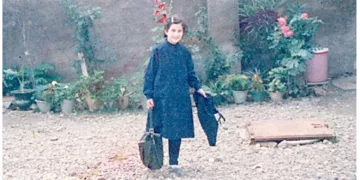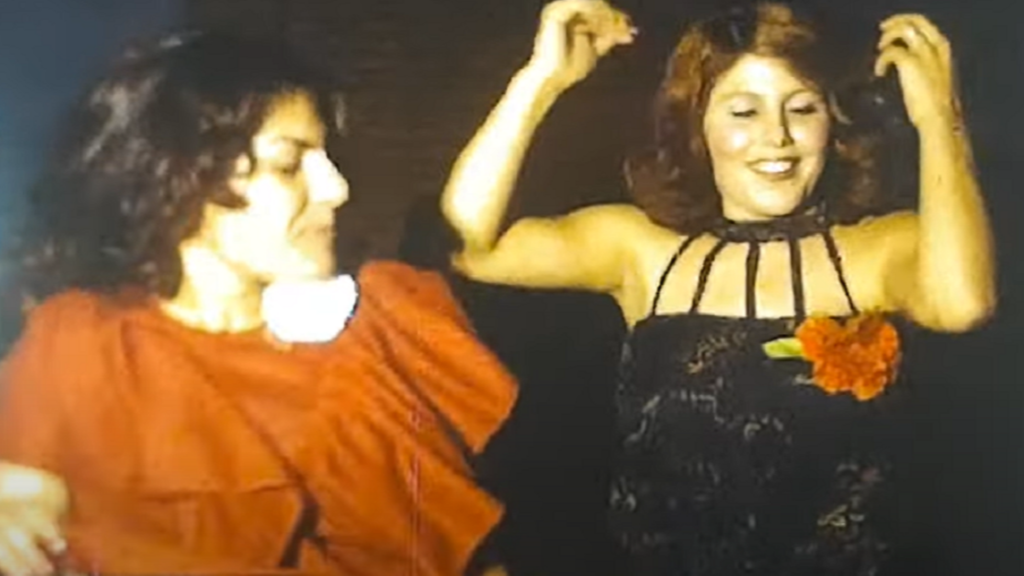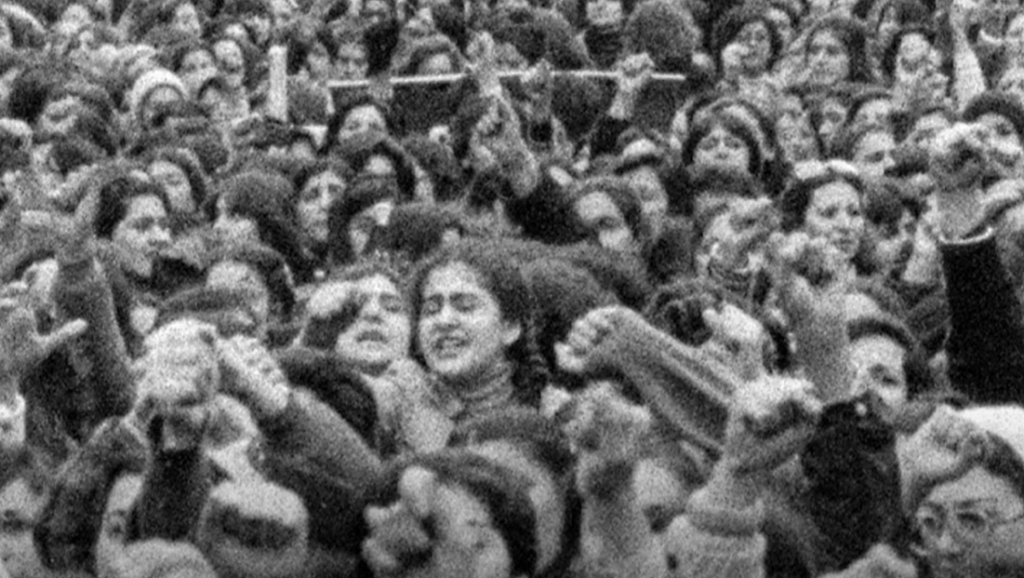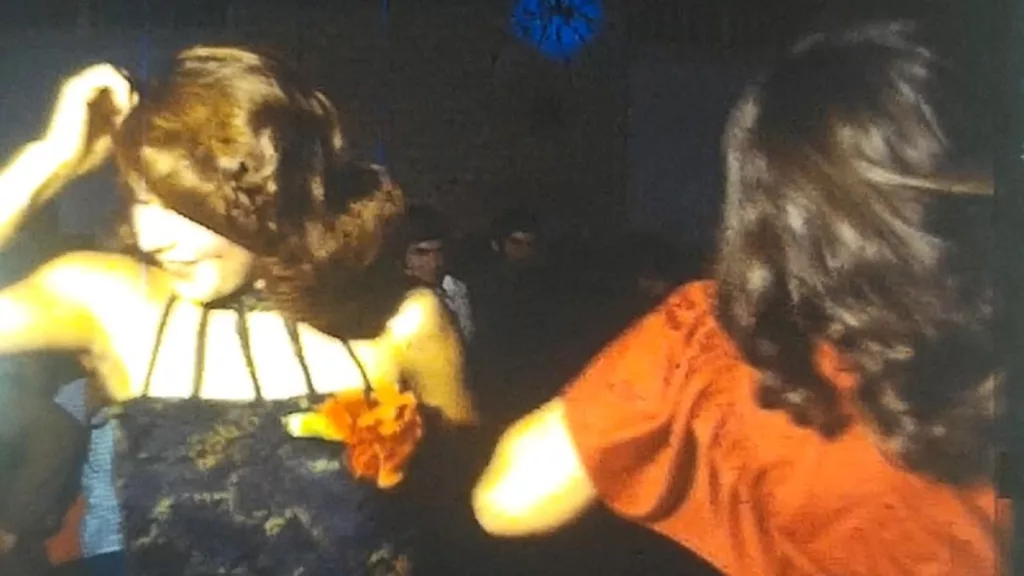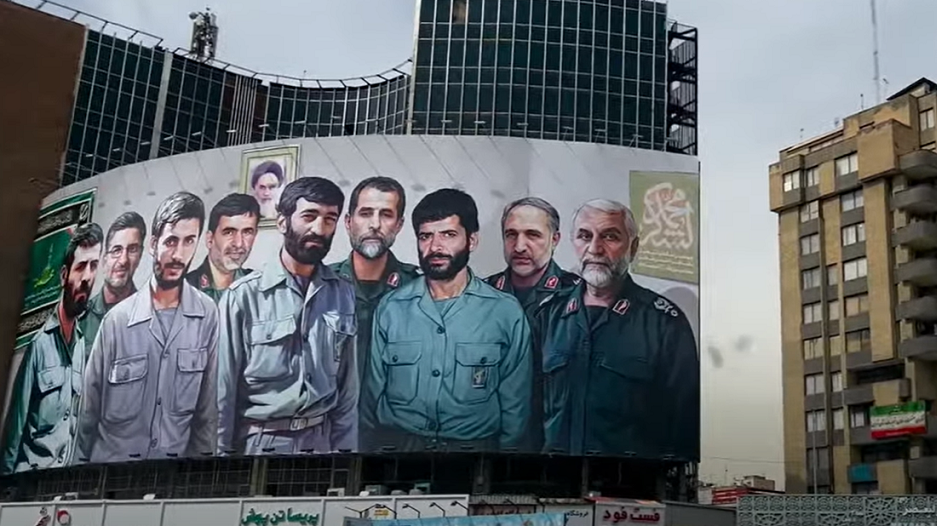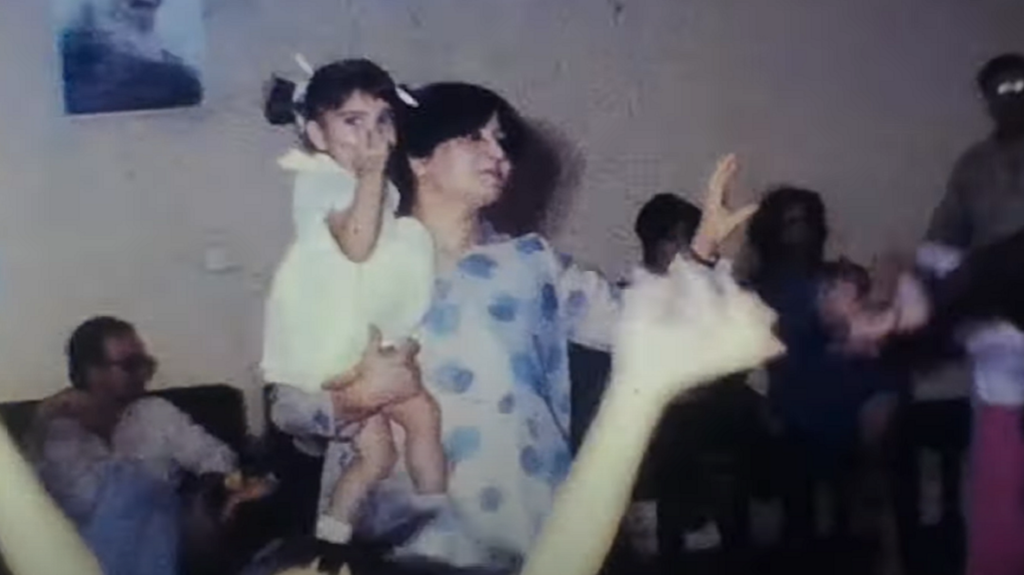“My Stolen Planet,” the searing debut documentary from Iranian filmmaker Farahnaz Sharifi, is a revelatory cinematic excavation of personal and political upheaval. Born just weeks after the 1979 Iranian Revolution, Sharifi’s entire existence has been shaped by the regime’s oppressive policies, particularly those curtailing women’s rights and freedoms. Yet from this cauldron of turmoil emerges a profound meditation on resistance, collective memory, and the resilient human spirit.
Seamlessly interweaving intimate autobiography with searing socio-political commentary, the film resonates with profound urgency given the ongoing “Woman, Life, Freedom” protests roiling Iran. Sharifi’s deeply personal artistic vision coalesces into a powerful artistic statement staking claim to Iranian women’s autonomy over their stories, their bodies, and their nation’s future. With raw vulnerability and bold defiance, “My Stolen Planet” dares to reclaim what was so brutally stolen.
Dual Realities Interwoven
At its core, “My Stolen Planet” traverses the diverging trajectories of Sharifi’s public and private existences in a perpetually bifurcated Iran. Through masterful editing, her narration guides viewers through the starkly contrasting worlds she inhabited – the carefree intimate sphere of family and friends versus the repressive outer society demanding conformity.
Vintage home videos depict joyous scenes of unveiled women dancing, singing, and embracing life’s simple pleasures, viscerally juxtaposed against archival footage of violent protests and Sharifi’s own childhood self begrudgingly donning the mandatory hijab. This symbolic garmenting and ungarmenting becomes a powerful cinematic motif.
The film’s narrative backbone intertwines Sharifi’s solitary defiance with the larger Iranian women’s movement’s collective resilience. Her obsessive archiving of forbidden personal memories from other households metaphorically represents reclaiming the nation’s suppressed identity. As state propaganda propagates a revisionist history, Sharifi brazenly rebuts with an alternative personal history culled from candid footage and photographs defiantly captured at great risk.
Assembling this cinematic mosaic from disparate fragments, Sharifi’s avant-garde fluidly transitions between mediums, aspect ratios, and periods. The ubiquitous use of phone cameras to subversively document both public protests and private celebrations accentuates how the act of recording itself became an essential form of resistance under authoritarian rule.
Resistance Etched in Celluloid
The thematic core of “My Stolen Planet” emanates from its searing interrogation of oppression, resistance, and the vital preservation of personal and cultural memory. Sharifi’s auteur vessel for expressing these complexities is her obsessive archiving of forbidden imagery and defiant documentation amid the Iranian regime’s draconian controls over public and private life.
For the female subject under this totalitarian patriarchy, every innocent whim – dancing, singing, displaying one’s hair – is criminalized, reinforcing the existential deprivation of autonomy. Sharifi poignantly contrasts her childhood’s idyllic home movies, replete with unveiled female figures reveling in uninhibited joy, against sobering reminders that such simple human expression was systematically proscribed. The compulsory hijab becomes a visceral embodiment of bodily oppression.
Yet in amassing this subversive personal archive, Sharifi and her collaborators transform the very act of documentation into a form of resistance itself, preserving identity and history that the regime endeavors to rewrite or erase altogether. Each intimate familial snapshot, each fragile reel of 8mm footage defiantly celebrating banned traditions, is itself a brave assertion of selfhood.
This dichotomy between the public and private spheres is personified through the recurring metaphor of Sharifi’s house – a sanctum where women can experience fleeting moments of liberation only to then be abruptly “re-veiled” upon reentering the oppressive civil sphere. The haunting notion that one’s own home, heritage, and sense of selfhood can become occupied territory lends profound pathos.
Throughout, Sharifi proffers a damning indictment of the regime’s unconscionable human rights abuses and its audacious attempted erasure of an entire gender’s history and cultural identity. By centralizing an archive of contraband imagery and audio-visually summoning the dissident voices the state strives to silence, “My Stolen Planet” achieves brilliant vindication. Its greatest power derives from these reclaimed personal memories permanently etched into celluloid.
“Delve into the dark corners of British history with ‘The Long Shadow’, a series that sheds light on the victims of the Yorkshire Ripper. Read our The Long Shadow review for an in-depth look at how this gripping drama brings the stories of the victims and their families to the forefront, challenging societal views on crime and victimhood.”
Visceral Artistry Emboldens Truths
Shirifi’s directorial hand exhibits a measured deftness, allowing the visceral imagery and emotionally-charged subject matter to remain centralized rather than overwhelmed by showy techniques. Her editing is particularly masterful, fluidly transitioning between formats, aspect ratios, and time periods to create an impressionistic visual collage honoring both individual and collective memory.
The avant-garde integration of archival footage from myriad sources – jerky home videos, crisp digital clips, even pixelated cellphone captures – achieves a multitextured aesthetic rawness. These contrasting visuals, juxtaposed in sudden jolts or languid dissolves, imbue proceedings with an authenticity that heightens the emotional stakes. Far from clinical detachment, Sharifi’s personal investment in honoring these forbidden memories is palpable.
This intimacy is amplified by the immersive soundscape meticulously constructed. Daniel Wulf’s nuanced sound design imbues each frame with subtle textural details – the whirring of an 8mm projector, the crunch of gravel on protest marches, the tremulous exhales of perseverance. Atena Eshtiaghi’s haunting minimalist score, anchored by melancholic piano refrains, renders the celestial longing of displacement all the more wrenching.
Shirifi’s greatest technical accomplishment, however, remains her symbolic curation and juxtaposition of archival materials. From the opening frames of silent, grainy home videos exalting life’s simple joys, the terrible beauty of what this regime has endeavored to efface is etched into our consciousness. These luscious vignettes are repeatedly shattered by jarring inserts of violent statecraft and grotesque human rights violations.
Each dissolve from family portraiture into baton-wielding soldiers trampling protests hammers home the agonizing dissonance of Sharifi’s national identity being so perpetually fractured between personal truth and authoritarian revision. This strategic editorial cadence profoundly immerses us within the paradoxical double existence she’s endured.
Unflinching Authenticity Personified
At the tenacious heart of “My Stolen Planet” is Farahnaz Sharifi’s unwavering commitment to presenting an unflinchingly authentic autobiographical portrait. Her deeply personal narration anchors the film, guiding viewers through the fraught duality of her upbringing while rendering the larger political Context with sobering clarity.
Sharifi doesn’t merely analyze her plight from an academic remove but rather makes us intimate witnesses to her tumultuous internal voyage. We share in her simmering rage one moment through fervent voiceover, then are gutted by the fragile humanity exposed in home videos the next – a mother’s warm embrace, a child’s unbridled glee before having such innocence shattered.
These visceral family artifacts, combined with the vulnerability of video conversations with loved ones like her ailing mother and exiled friend Leyla, elevate the emotional stakes far beyond rote documentary exposition. We don’t just understand Sharifi’s perspective intellectually but feel it profoundly on a human level.
This emotive intimacy then magnifies the larger significance of the Iranian women’s movement as not just an ideological struggle but one comprised of countless individual sacrifices and small defiant acts. Each anonymous protester bearing the brunt of state violence in Sharifi’s amassed footage represents both terrible injustice but also extraordinary perseverance in the face of oppression. Their unforgettable collective voices sear into our consciousness.
“Uncover the harrowing truths and cultural conflicts in our Stolen review. Follow Elsa’s journey as she battles to protect her Sami heritage from environmental threats and prejudice, offering a poignant look at resilience and activism.”
Indelible Vessel of Resistance
As a searing intervention into ongoing human rights atrocities, “My Stolen Planet” pulls no punches in its scathing indictment of the Iranian regime’s systematic oppression and erasure of individual and cultural identity. Sharifi’s documentation of both state-sanctioned violence and persevering acts of defiance renders the film an indispensable historical artifact of resistance.
Its greatest political impact likely derives from this raw, firsthand authenticity. By centralizing the voices and visual testaments of those subjected to authoritarianism’s cruelties, “My Stolen Planet” achieves a visceral urgency that statistics and academic analysis alone cannot. These are not merely anonymous victims but vivid human portraits that cannot be ignored or revised away.
In this vein, the film emerges as a vital continuation of the Iranian documentary tradition exemplified by searing works like Jafar Panahi’s “This is Not a Film” and Arash Lahooti’s “Trucemaking.” Like those trailblazers, Sharifi transforms the very process of moviemaking into an act of political defiance, smuggling forbidden imagery across borders.
However, “My Stolen Planet’s” profoundly personal dimensions and incorporation of autobiography into the archive mark a thematic evolution. By implicating her own family’s heritage and cross-generational memories into this cinematic mosaic, Sharifi expands Iranian resistance cinema into intimate new emotional and philosophical territories about selfhood, trauma, and cultural reclamation.
Ultimately, Sharifi has crafted an enduring artistic statement inspiring hope even amid oppression’s bleakest moments. The mere existence of “My Stolen Planet” as undeniable proof of Iranian individuals’ perseverance embodies the film’s existential victory – a brave testament to the regime’s brutalities but also to the people’s resilient refusal to ever surrender their truths.
Transcendent Art of Reclamation
In scrutinizing “My Stolen Planet” through various critical lenses, several key strengths shine through resoundingly. Sharifi’s raw vulnerability as an autobiographical storyteller, fusing uncompromising political outcry with staggeringly intimate personal testimony, ensures a profound emotional resonance. Her audacious curatorial ingenuity in assembling an archive of contraband visual memories into impressionistic cinema is likewise extraordinary.
If any shortcomings exist, they are mere nitpicks – perhaps the occasional tendency toward overly didactic narration or some slightly uneven tonal shifts between the家 james activist polemic and poetic memoir modes. But these are negligible quibbles in the face of such an overwhelming artistic achievement and vital humanitarian statement.
“My Stolen Planet” demands to be experienced and reckoned with, both as searing political advocacy and as a formidable aesthetic work of staggering beauty amid grotesque inhumanity. By any criterion, it is simply one of the most essential documentary films of not just recent years but of this century thus far.
In resolutely defying all efforts to be rendered voiceless or unseen, Farahnaz Sharifi has crafted a monument to resistance, a celebration of enduring Iranian identity, and above all, a transcendent vindication of the humanity the regime has so ruthlessly endeavored to extinguish. This is the harrowing yet ultimately life-affirming truth they cannot steal.
The Review
My Stolen Planet
A transcendent, viscerally powerful act of cinematic resistance, "My Stolen Planet" is essential viewing. Farahnaz Sharifi's searing personal testimony and curatorial ingenuity forge an enduring artistic statement and invaluable historical document. By defiantly centralizing the individual voices, memories, and identities that authoritarianism endeavors to silence and erase, this intimate epic achieves a profound universality as both political advocacy and poetic memoir. An audacious, emotionally overwhelming vindication of humanity in the face of oppression's cruelest inhumanities.
PROS
- Powerful personal storytelling and autobiography from director Farahnaz Sharifi
- Unique blending of intimate home movies with protest footage and archival materials
- Raw, visceral depiction of oppression and human rights abuses under Iranian regime
- Explores importance of documentation/filmmaking as an act of resistance
- Poetic editing and immersive sound design elevate the emotional impact
- Provides crucial insight into the struggle for women's rights in Iran
- Celebrates Iranian cultural identity, memory, and the resilience of the human spirit
CONS
- Certain segments veer into slightly didactic or heavy-handed territory
- Tonal transitions between poetic and polemic modes can feel abrupt at times
- Limited context around some of the archival footage and its sourcing
- May be emotionally overwhelming or disturbing for some viewers
